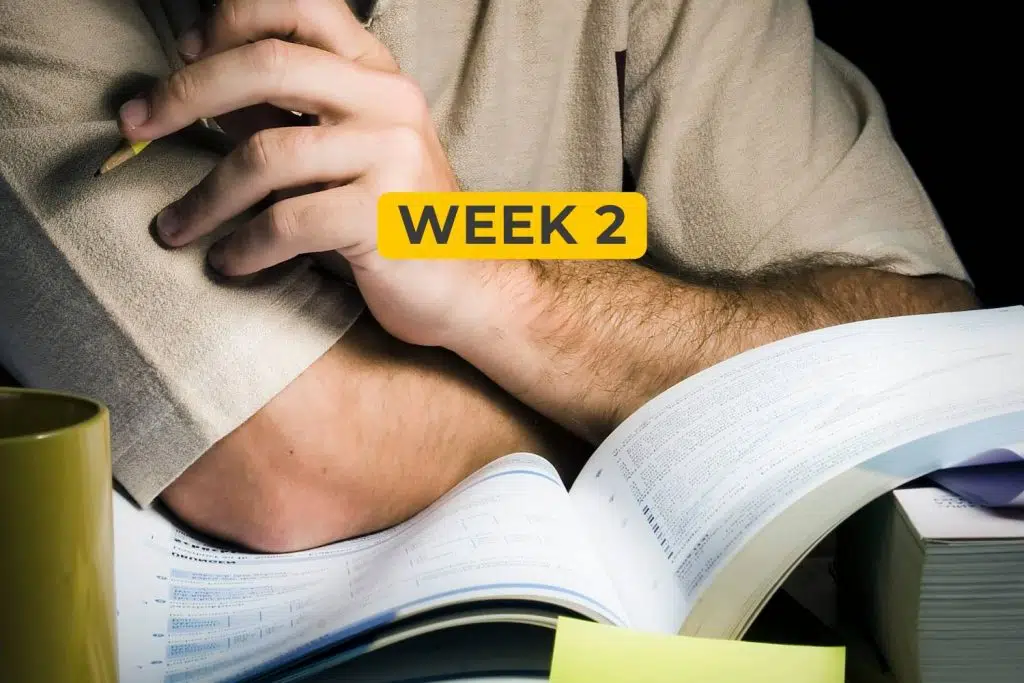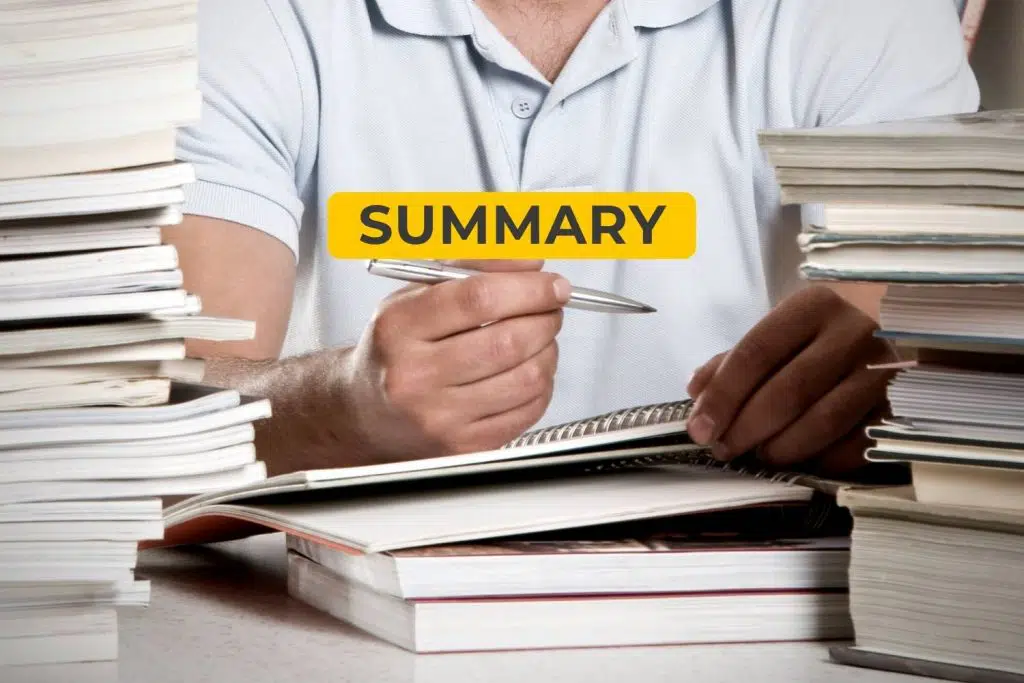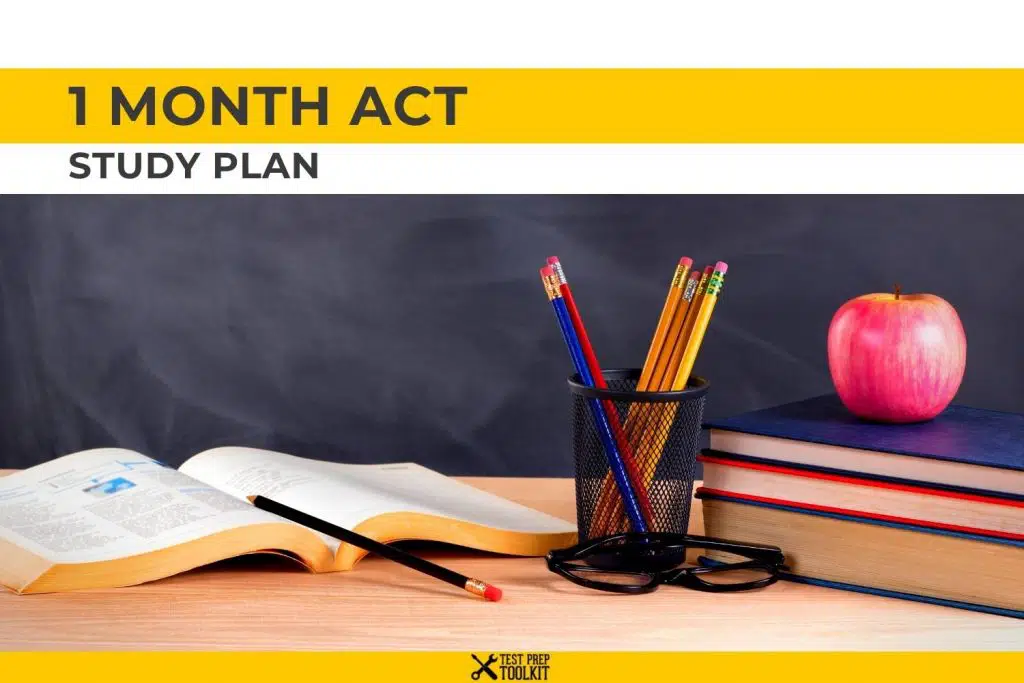Without taking the optional 40-minute writing test, the ACT is still 2 hours and 55 minutes long. It is a daunting task to try and cram all the knowledge you need for the test into your brain in just 30 days. That’s why you need to get organized. Take the time to plan out exactly how and when to study for the ACT.
The 1 Month ACT Study Plan How-to Guide

Find out what materials you need to help you study for the ACT, what study methods you should use, and what you need to do each day to keep yourself on track to getting the score you want. In all cases, this will require developing a very detailed plan.
Can You Prepare for the ACT in 1 Month?
Yes, it is possible to prepare for the ACT in 1 month, but it requires planning, dedication, and persistence. It also depends on your baseline and how many more points you need to get to your target score.
The more points you need to add to your baseline to get to your target score, the more time you’ll have to put into studying.
Baseline Score
The first thing you should do is take an ACT practice test to see where you’re at. This will help you plan your study guide by giving you a baseline and an idea of how many points you have to go to get to your target score.
Take the official ACT practice test as if it were the real thing. Find a quiet place to work, set a timer, and do not take breaks longer than what you would be allowed during the ACT. This practice testing format gives you an accurate reading of your current abilities and where you need to go.
Once you finish, you’ll need to figure out your score from the raw data to a scaled number. That’s your baseline, and from there, you can set a target score that will determine how much more studying you have to do.
Target Score
This is the score that you want to get on your ACT. While a perfect ACT score is 36, the average is 21. A good score for the ACT is 21 and above, so aim for something reasonable but attainable.
You’ll also want to look at the college you wish to apply for and see if they have a set ACT score to gain admission. A good rule of thumb is to get into the top 75th percentile of the most demanding school you want to apply for. This way, you’ll be sure to gain entry into all the schools you apply to.
How Much Studying You’ll Need to Do

How many points you need to gain will determine how many hours you need to put into preparing for the ACT. Here’s an average of how many hours it will take to get to your target score.
- 0-1 point boost: 10 hours
- 1-2 point boost: 20 hours
- 2-4 point boost: 40 hours
- 4-6 point boost: 80 hours
- 6-9 point boost: 150+ hours
These are approximations since everyone studies at a different pace, but it’s a good general reference to go by. Since you only have a month to study, it could mean a lot of cramming if you need a big point boost. Make sure you don’t burn yourself out and do poorly when test day comes around.
Be realistic with your goals and do the best you can with the time available. For example, if you desire to boost your points highly, study for a longer period of time before completing another practice test. This will prevent you from wasting precious study time on a lengthy practice test.
What Materials are Needed

If you don’t have an ACT prep book, you’ll want the official prep guides to help you out. Additionally, consider the various websites that can help you with prepping for your ACT. You can even take a self-paced course to help you through the fundamentals of the ACT. We recommend the Best ACT Prep Courses here. An ACT Prep app is also available to help you ace your test.
The following materials have proven very useful to a number of test-takers:
- The Official ACT English Guide
- The Official ACT Mathematics Guide
- The Official ACT Reading Guide
- The Official ACT Science Guide
- ACT flashcards
- The Official ACT Prep Guide
- A timer for taking practice tests
- A calendar or online app to get you organized
Gather what works best for you and use it to your advantage!
How to Study for the ACT in a Month

Not only do you need to have a plan in place on when you’ll study for your ACT, but you also need a plan for how you’re going to study. It does no good reading the guides and not doing practical exercises or tracking your progress.
Use Practice Tests to Track Your Progress
At the beginning of each week, go ahead and take a practice test to see how you’re improving. Not only will it show if your study plan is effective, but it will also prepare you to take the actual test.
Like finding your baseline, you need to make it as close to the actual ACT as possible. Taking the practice test as if it’s the real thing spurs your brain into the correct frame of mind. It puts your brain and body under the same type of stress and pressure that you’ll get on the official test day.
Review Basic Topics in English, Math, and Science

The test focuses on three subjects: English, Math, and Science. The subtopics of these subjects make up different percentages of the entire examination. Familiarizing yourself with these will help your overall performance and pinpoint any topics you aren’t strong on so you can focus on them.
English has four subtopics that cover everything from run-on sentences to idioms to wordiness.
- Rhetorical skills: 40-55%
- Sentence structure: 20-25%
- Punctuation: 10-15%
- Grammar and usage: 10-15%
Math has six subtopics which mainly cover algebra and geometry.
- Pre-algebra: 20-25%
- Plan geometry: 20-25%
- Coordinate geometry: 15-20%
- Elementary algebra: 15-20%
- Intermediate algebra: 15-20%
- Trigonometry: 5-10%
There isn’t much you need to know for science other than how to read a chart or graph. However, the ACT for science typically has four questions where you can’t deduce the answer from the question itself. The best way to know the answer to these is to brush up on basic biology, chemistry, physics, and science-based math skills.
Focus on Weaker Subjects

This test is one occasion where you don’t want to play to your strengths. Figure out which subject is your weakest and get the basics down. Take more time to study this subject without distractions, and you will find your points in that category increasing faster than you could imagine.
Focusing on your weaknesses will boost your overall score as it is likely the area where you are losing the most points. By studying your weakest subject first, you can look at it with fresh eyes and an alert mind.
1 Month ACT Study Plan Week by Week
The best way to organize your calendar is to take a practice test at the beginning of each week and score it to know how much you improve from the previous week. Then split your subjects into different days so you can focus on one exclusively.
Our brains don’t do well at multitasking, so focusing on one subject at a time is the best way to store the knowledge you’re learning in your long-term memory banks.
Week 1

Your first week is all about getting your baseline and seeing where you need to improve. Then go through your calendar and pick days where you can devote several hours of your time to a single ACT subject. Keep those days consistent throughout the week, so it becomes a habit to sit down and study rather than procrastinate or forget.
When you review your test, take the time to go through it and see what you got right and what you didn’t. This will help cement correct answers into your mind as well as showing you opportunities for improvement.
The review of your test should take at least as long as actually taking it, if not more. Don’t be afraid to split taking the test and reviewing into different days.
You should make a detailed list of topics to study so you know what to focus on during your prep times in each subject.
- Take a baseline practice test
- Review your test thoroughly
- Study and prep for each section of the examination, reviewing foundational information first
Week 2

You should start this week with another full-length practice test, going over your answers once more. Is there anything from your list of things to study you can cross off? Did your score get better? Celebrate the little wins, and don’t get discouraged if nothing seems to be improving. Seeing improvements can take time, after all.
If you’re having trouble answering all the questions, you should also practice test-taking strategies this week so you can nail all of them in one sitting. Remember to take the test like it’s the real thing to get used to the time constraints.
- Take a full-length practice test
- Review the test
- Celebrate the little wins
- Buckle down and keep studying the fundamentals of each subject
Week 3

You’re halfway there. You should start getting out of the foundational review and deep-diving into more problematic areas such as functions or idioms.
Start this week the same as all the rest with a full-length practice test and review. Remember that it’s okay to let your brain rest between test-taking and review. Looking at it with fresh eyes and a fresh mind is preferable.
Continue celebrating the small wins as you become more comfortable taking this test and learning the knowledge you need to ace it.
- Take another full-length practice test
- Go through a review
- Celebrate crossing things off your to study list
- Deep dive into problem subjects that trip you up
Week 4

It’s the last week of studying. Take a deep breath, and continue studying as much as possible this week. Then allow your mind a couple of days to rest and recharge before your test day.
Whatever you do, do not cram the night before the test. If you still haven’t gotten Idioms yet, frantic cramming won’t help you. In fact, it will probably hurt you because you haven’t given your brain a chance to put it into long-term memory.
Start this week like you’ve done every week so far and take a practice test before reviewing it.
Since this is the last week of reviewing, focus on things you know you can pick up to get those few extra points. Study to perfect your performance on those questions you’re getting right about 75% of the time.
Don’t be afraid to throw in some foundational review and test-taking strategies as well to make sure you have everything cemented into place.
- Take a final full-length practice test
- Review what you’re getting right most of the time
- Perfect those answers for more points
- Celebrate that it’s almost over
- Take a couple of days off before the test to let your mind rest
- Walk-in on test day confident that you’ll nail it
In Summary

When it comes to planning for the ACT, there are many things to take into consideration. You need to know where you’re at, where you want to be, how to study effectively, and have plenty of studying materials and practice tests available.
If you plan on taking the ACT and don’t have time to prep several months in advance, this 1 month ACT study plan will help you succeed. Remember to organize everything, set alarms, so you don’t forget, continue to study, and relax because you got this.

